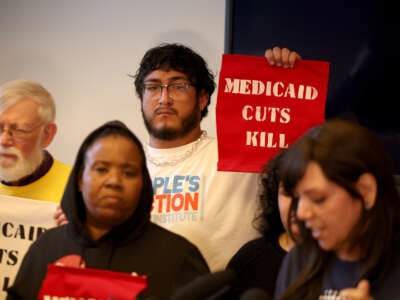Homelessness among newborns, infants, and toddlers skyrocketed from 2022 to 2023, impacting 446,996 newborns, infants, and toddlers, according to a new report.
SchoolHouse Connection, in partnership with Poverty Solutions at the University of Michigan, found a 23 percent increase in the number of unhoused children under the age of 3 since 2021. Their situations were varied. The report, “Infant and Toddler Homelessness Across 50 States: 2022-2023,” found that some families were staying in temporary shelters or short-term transitional housing, while others were living doubled up with friends or family, camping, or sleeping in cars, abandoned buildings, or bus or train stations.
But as horrendous as these numbers are, unhoused people and their advocates fear that if Donald Trump’s big, brutal budget bill gets Senate approval, the situation for unhoused families and those teetering on the edge of economic precarity will soon get significantly worse.
Never miss another story
Get the news you want, delivered to your inbox every day.
Senior director of Strategic Initiatives and Partnerships at SchoolHouse Connection, Erin Patterson, was one of the authors of the report. She told Truthout that several factors contributed to the 2022-23 spike in unhoused children. “The reason for the increase is no mystery given the lack of affordable housing throughout the country,” Patterson said. “Add in the expiration of the COVID eviction moratorium and the lasting impact of the virus, and a perfect storm of factors impacting low-income families with young children unfolded.”
That perfect storm can have dire consequences.
“Between birth and the age of 3, a child’s brain develops faster than at any other time in life,” the report states. “Tragically, an increasing number of infants and toddlers move through these critical years without a safe and stable home, an experience that jeopardizes their healthy development and future.”
Moreover, when pregnancy and homelessness intersect, prenatal care can become inaccessible. According to the National League of Cities, a lack of transportation to see health care providers, coupled with overt and covert discrimination against the unhoused, can mean that treatable pregnancy complications go unnoticed. Unsurprisingly, this increases the odds of preterm deliveries, lower newborn birth weights, and more frequent hospitalizations in neonatal intensive care units. Pervasive respiratory infections and asthma, frequent fevers, learning disabilities, and developmental delays are also commonly diagnosed as babies become toddlers.
“Any period of homelessness can have negative health impacts on fetuses and children,” the Loma Linda University Institute for Health Policy and Leadership warns.
In addition, being unhoused can exact an emotional toll.
Carol L. Hornbeck is a Minnesota-based family therapist who frequently works with people experiencing homelessness. “Babies need routines,” she told Truthout. “These are hard to establish when a family does not have a permanent home. The lack of routine, the lack of structure, causes anxiety. Babies pick up the anxiety of the adults who are caring for them.”
This disquiet, she explains, can become apparent when a child begins school or preschool. “It’s hard for unhoused kids to pay attention, concentrate, and receive new information when they’re anxious,” she said. What’s more, Hornbeck says that children experiencing homelessness are often diagnosed with Attention Deficit Hyperactivity Disorder. “They usually don’t have it,” she said. “What they have is hypervigilance due to fear and worry.”
This can also be expressed outside of school. “Kids who’ve been unhoused come into a new place and immediately look around to see if any food is available,” she said. “The first thing I notice when I meet these kids for the first time is that they quickly check out their surroundings to see if they’re safe and if they’ll find something to eat if they get hungry.”
Diane Nilan, president and founder of HEAR US, Inc: Giving Voice and Visibility to Homeless Children and Youth, agrees with Hornbeck and adds that the long-term impact of being unhoused as a child can last into adulthood. “People I met in a shelter I worked in 30 or 40 years ago are now showing the aftereffects of the trauma they experienced decades ago as kids,” she told Truthout. “The trauma of instability, of having no place to stay, and of being raised by parents who were constantly worried about where they’d sleep and what they’d eat can cause fears that never go away. This can cause physical and mental health problems later in life.”
Alice Jeffrey, a once-unhoused mother who is now living in Oklahoma City, Oklahoma, hopes to avoid this outcome.
Although Jeffrey’s daughter, Harmony, was taken by child protective services when she was days old in May 2022, the pair are now reunited and are doing well. In fact, Jeffery has become something of a model for other unhoused women and recovering drug users. Now 38, Jeffrey was appointed to the Parent Partnership Board of the Oklahoma Commission on Children and Youth earlier this year and is attending Oklahoma State University to pursue a degree in substance abuse counseling. But despite these achievements, she’s found the experience of homelessness hard to shake off and describes being homeless while pregnant and in recovery from meth use, as “dehumanizing.”
“Not having a bathroom of your own when you’re pregnant is awful,” she told Truthout. “You want to take a bath. You want privacy to deal with what is happening to your body, and it does not exist.”
Jeffrey says that she got clean while pregnant, but the fact that she was living in a van with someone who was still using led to Harmony’s removal. “I thought that since I was clean and the baby was born clean, it would be OK, but apparently, this was not enough, so Harmony was placed. At the time, I was broken, hurt, but I got lucky. Harmony was given to an amazing family. They sent me photos of her every single day. At first, I had to submit to supervised visitations, but I slowly got myself together, stayed clean, and five months after Harmony was born, she was returned to me.”
That this story has a happy ending is heartening; nonetheless, Jeffrey says that Harmony’s removal still bothers her. That said, she told Truthout that she is grateful to have an ongoing and loving relationship with Harmony’s foster siblings and parents. “We go to church with them and have Sunday dinner together every week,” she said. “I thank the Lord every moment or every day for these people because so far, Harmony seems to be doing fine. I believe this is because the foster family and I bridged, but there is always a huge risk of trauma manifesting later.”
But Jeffrey is not letting her fears stop her and says that she is stoked to speak about what she’s been through. “Telling my story gives my life meaning,” she said. “If I can be brave, if I can be vulnerable and put a face to homelessness and addiction, I want to do it.” Jeffrey also wants to promote a “co-parenting model” like the one she and Harmony’s foster family have developed. At the same time, she is paying close attention to the news and worrying that looming budget cuts will undermine the already tattered social safety net that has allowed her to return to school and receive public benefits.
The stakes have rarely been higher.
“Children Under Attack: How Congressional Assaults on Health and Food Programs are Endangering the Youngest Americans,” a report compiled by First Focus on Children, the AFL-CIO, and UnidosUS lays out the scope of the proposed retrenchment for the 33.8 million children under 18 who rely on Medicaid, SNAP, or both for food and medical care. Trump’s budget is poised to boot millions off both programs, decimate clean energy efforts, slash federal spending on housing and child care assistance, defund climate resiliency work, eliminate funding for Planned Parenthood and other health centers, and eviscerating public pre-K to college education programs — all while simultaneously hiking the budgets of the Pentagon, Immigration and Customs Enforcement, and Customs and Border Patrol, and increasing the domestic surveillance and prosecution of dissent. The resulting “savings” will provide a 10-year $3.8 trillion tax cut to those earning $800,000 or more annually.
What’s more, approximately 11 million people — about a quarter of those who rely on SNAP to eat, including 4 million kids, and 500,000 adults aged 65 or older or living with a disability — will lose some or all of their food assistance.
Patricia Cole, a senior policy officer at Zero to Three, a Washington, D.C.-based advocacy group that focuses on the early childhood needs of infants, toddlers, and their families, told Truthout that the budgetary threat has put advocacy organizations into “defensive mode since the threats are coming from every direction.”
Along with other advocates, Zero to Three is “raising up” impacted individuals and encouraging them to tell their elected officials about the importance of Medicaid, SNAP, the Low-Income Energy Assistance Program, Head Start, and other safety net entitlements in their lives. “Congress members and this administration seem to have a lack of identification with, and understanding of, what the vast majority of families’ lives are like,” Cole said. “There seems to be the idea that the government has no responsibility for supporting families. Instead, Congress seems hellbent on cutting spending, advancing defense, and reducing immigration. But even if they wipe out every social safety net program, it will not wipe out the national debt. It will, however, leave families with infants and toddlers who live at or under 200 percent of the federal poverty line, in dire straits.”
Unions and anti-poverty, child welfare, education and legal advocates — as well as impacted people like Alice Jeffrey — are working overtime to push back on the House-approved budget as the reconciliation process takes shape. Some are also urging states to pick up the slack if federal cutbacks are enacted.
The need is obvious.
“The reality of unhoused families bouncing between shitty hotels, cars, and couches is horrific,” Diane Nilan told Truthout. “As a society, we tend to ignore kids who are suffering, and any attention that goes to the unhoused tends to focus exclusively on adults. We seem to forget that children grow up. If Trump’s budget is passed, it will destroy the shred of a safety net that now exists. We’re looking at overt cruelty.”
Urgent appeal for your support: Help us fight political repression.
Truthout urgently appeals for your support. Under pressure from an array of McCarthyist anti-speech tactics, independent journalists at Truthout face new and mounting political repression.
We rely on your support to publish movement journalism — in fact, we’re almost entirely funded by readers like you. Yet, donations are down at this moment of crisis. We may end this month in the red without additional help, so we’ve launched a fundraiser.
We have 9 days to hit our $50,000 goal. Please contribute a tax-deductible gift to Truthout at this critical moment.
Read full article at source
Stay informed about this story by subscribing to our regular Newsletter

